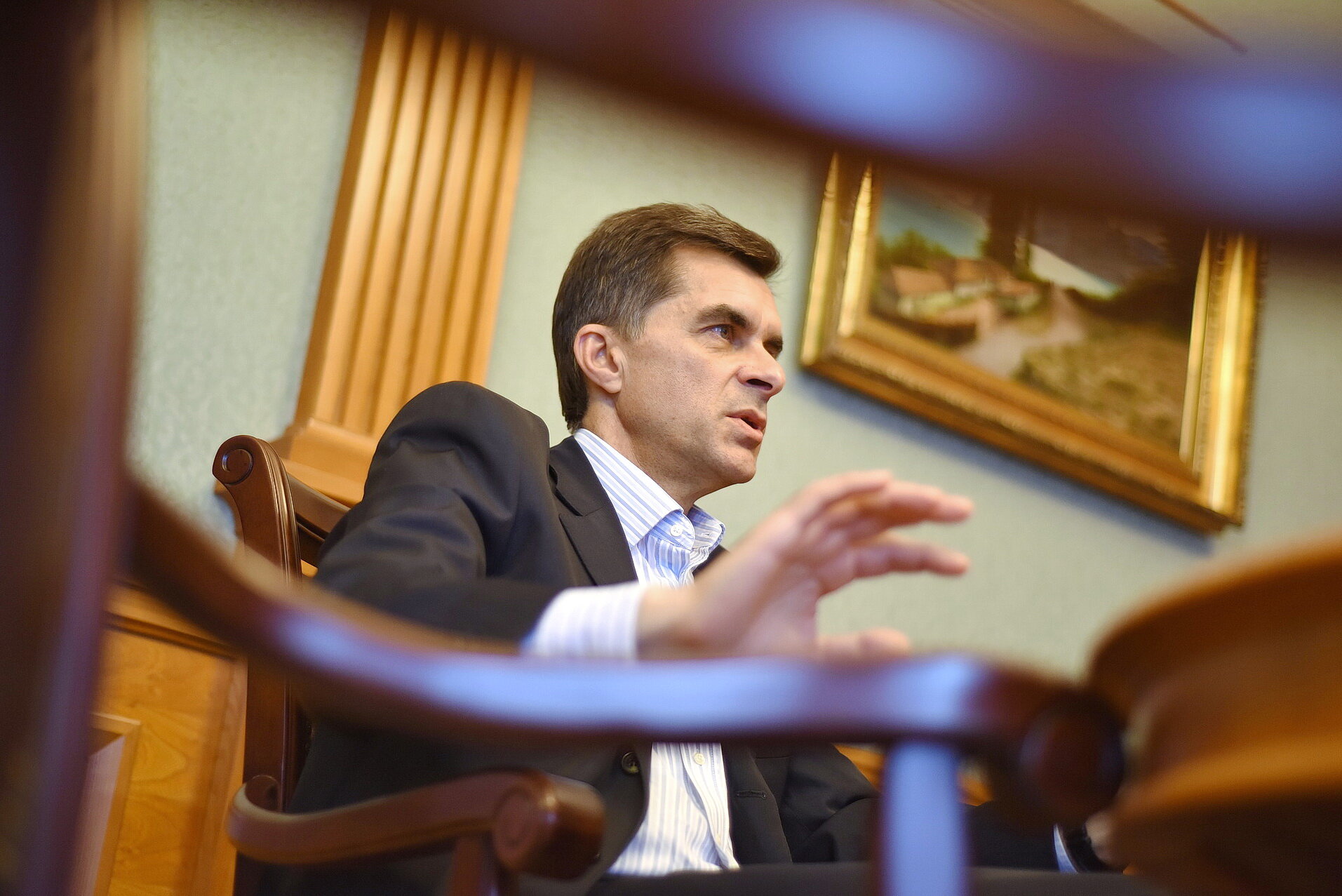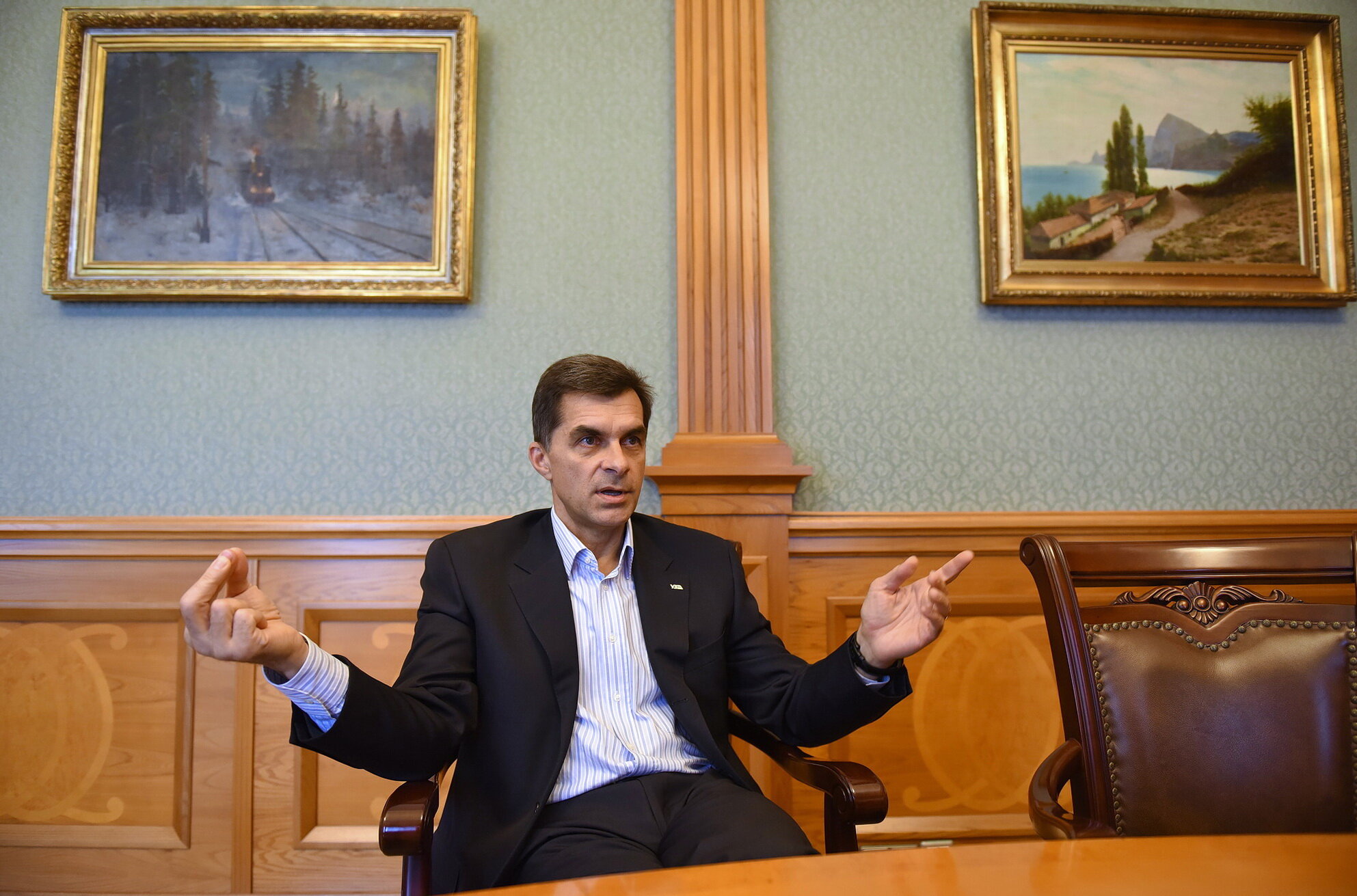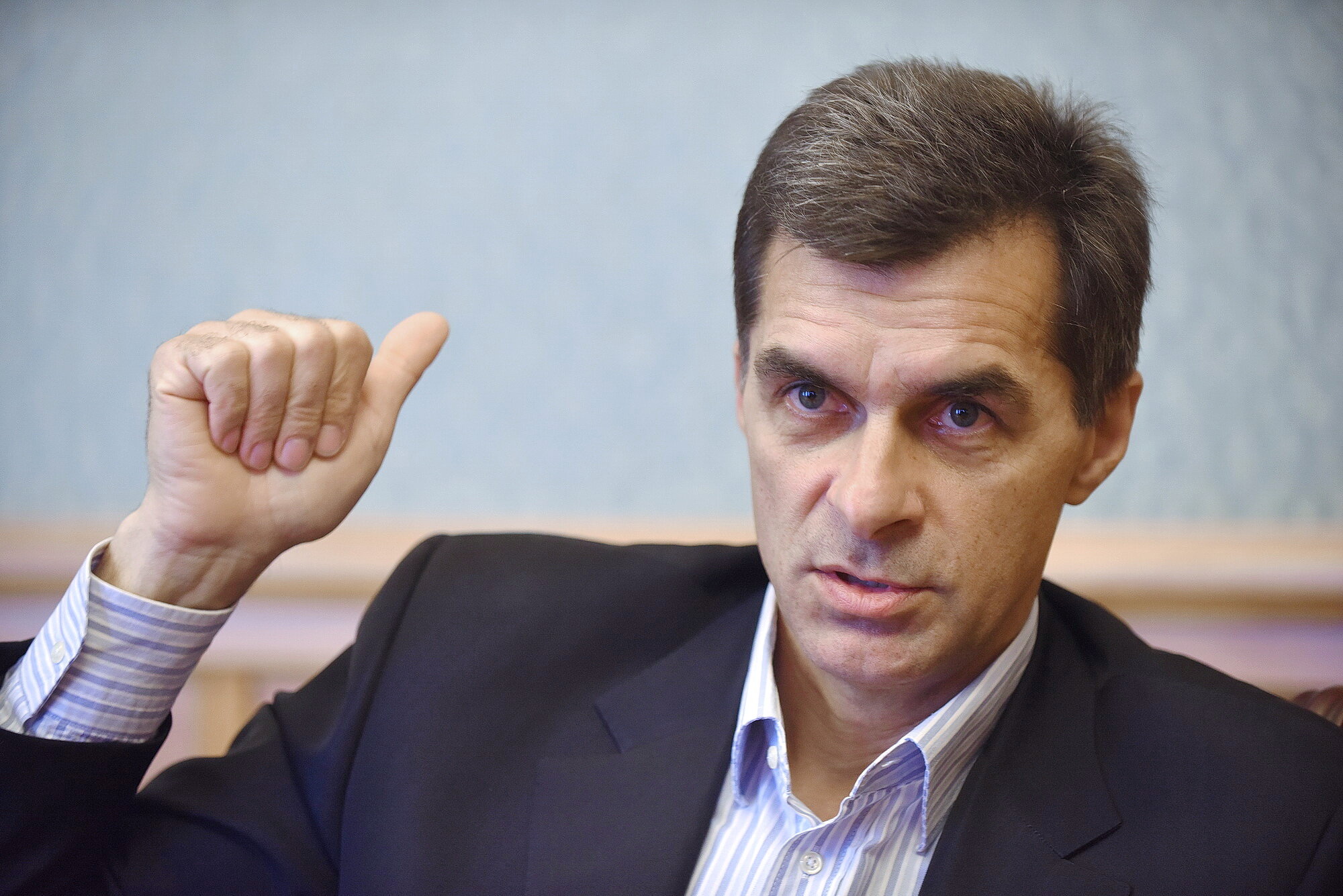After three previous acting CEOs of Ukrzaliznytsia, Ukraine’s railway monopoly, the year of 2020 finally has a permanent manager at the country’s largest state-owned enterprise — Volodymyr Zhmak.
For Zhmak, 56, Ukrzaliznytsia is a “professional challenge” and his plan is to turn the largest state-owned enterprise — mired in corruption scandals, on the verge of bankruptcy and overstaffed with 250,000 workers — into a successful company.
“I want to turn trash into treasure,” says Zhmak. “There is a chance to make something beautiful out of this company.”
The government appointed Zhmak as Ukrzaliznytsia’s head on Aug. 26 with great support from Prime Minister Denys Shmyhal and Infrastructure Minister Vladyslav Kriklii.
Before taking the state position, Zhmak worked as a supervisory board member at Ukraine’s largest mobile operator Kyivstar. He also held a senior position at oil producer TNK-BP, which is owned by Russia’s Rosneft.
Starting in 2019, Zhmak had also worked as a supervisory board member at Kyiv Boryspil International Airport before the government appointed him as the railway manager this August.
Now, Zhmak feels confident that he can get the company out of the crisis in the next three years — the length of his contract at Ukrzaliznytsia.
“I’m not afraid to call fire on myself, because I already had to do it,” says Zhmak, recalling his experiences during the Soviet Union’s war in Afghanistan in the 1980s. He spent 26 months as an artillery scout, correcting artillery fire and calling for fire at its specific coordinates.

Ukrzaliznytsia CEO Volodymyr Zhmak talks with the Kyiv Post on Sept. 28, 2020 in his office in Kyiv. (Oleg Petrasiuk)
Alarming forecasts
Ukrzaliznytsia ended 2019 with $120 million in profit and forecasted further growth this year, but the coronavirus pandemic has ruined these plans.
Despite the multimillion losses, the Ukrainian government refused to help the company financially. In August, Shmyhal said that “if the enterprise is in turbulence, whether it is a monopolist or not, it must solve problems on its own, and Ukrzaliznytsia is no exception.”
Thus, Zhmak forecasts that the company’s financial results will be in the red by the end of the year — up to $350 million in losses.
However, he’s sure the next year “will be positive” if he is allowed to hire new top executives and if the government starts paying off its debts to Ukrzaliznytsia. The Education Ministry alone owes the railway company $35 million — mainly for the transportation of school and college students, who have a 50% discount on train tickets.
“It’s impossible to demand self-sufficiency from Ukrzaliznytsia without compensating the transportation costs,” says Zhmak.
Corruption, layoffs, tech
There are other ways to improve Ukrzaliznytsia’s performance and Zhmak plans to pursue them.
The first and major priority on Zhmak’s list is to create four enterprises under Ukrzaliznytsia’s umbrella that will focus on different fields: cargo transportation, passenger transportation, railway infrastructure, and centers to produce and repair trains.
Once it’s done, it will be easier to manage the giant. Besides, each company will be able to attract public capital and spend it on their development. One way is through an initial public offering.
The most interesting field for investors, according to Zhmak, will be cargo transportation that was responsible for 80% of the company’s income in 2019, or $3 billion. Passenger transportations, meanwhile, brings only losses — over $450 million last year.
“It can attract the European Bank for Reconstruction and Development or can access the London Stock Exchange,” he says. “It may be a very interesting asset for investors.”
But for now, albeit bringing profit, cargo transportation remains an underinvested, low tech and simultaneously corrupt area of Ukrzaliznytsia’s business.
The country’s oligarchs — including the richest Ukrainian, Rinat Akhmetov — use their political clout for their firms to transport on rails ore and metal at low, below-cost prices. After that, they export raw materials at world prices, experts say.
According to Sergii Leshchenko, member of the supervisory board at Ukrzaliznytsia, the railway company will lose around $160 million in 2020 due to such pricing, enough to buy 130 new passenger wagons. Leshchenko is also a Kyiv Post columnist and ex-member of the Verkhovna Rada, Ukraine’s parliament.
Meanwhile, Akhmetov’s System Capital Management (SCM), an energy, metallurgy and finance holding, has another view on the problem. In an official response to the Kyiv Post, SCM stated that Ukrzaliznytsia’s tariffs are “among the highest in the region, which allows it to receive several times higher profits than EU companies do.”
While prices for industrial products were falling, the freight tariffs were constantly increasing, by 63% from 2016 to 2019, SCM’s press service asserted.
“A significant part of the funds from the annual increase in tariffs for freight transportation is embezzled,” reads the statement. SCM believes that, by paying the current Ukrzaliznytsia tariffs, “metallurgists, agrarians, energy workers, miners, producers of cement and salt pay for corruption in Ukrzaliznytsia.”
“Any attempts to ‘bump heads’ between carriers with different tariffs are made precisely to distract attention from the problem of large-scale corruption in the company,” SCM claims.
To reduce corruption, Zhmak wants to make more freight transportation services official. For example, he wants to offer big financial-industrial groups to pay 20% more if they want to speed up transportation of their cargo up to 480 kilometers a day, instead of 320 kilometers.
Modern technology can also reduce corruption. Currently, 70% of 2,000 active locomotives aren’t equipped with GPS, making it hard to see where exactly the locomotives are. Even those 600 equipped locomotives weren’t displayed on the digital map properly before Zhmak took the reins.
“Now a train driver can’t just stop to smoke near the railway crossing, drain fuel and say that there was supposedly some kind of malfunction,” says Zhmak.
Apart from potentially rooting out petty theft, the tracking will also help to manage trains better by understanding which railways are overloaded — especially during harvest seasons — and try to fix that.
Zhmak wants the government to pay closer attention to procurement, where he says corruption flourishes on opaqueness and shady schemes. “To my big surprise, in tender committees, there are no representatives from the security department which can check contractors for their credibility,” he says.
Two more ways to improve performance at the 250,000-employee company is to lay off administrative and management personnel and ramp up the renovation of the decrepit locomotives.
Because “if we continue repairing 10 locomotives per year, we will keep doing it for the next 200 years,” he says.

Ukrzaliznytsia CEO Volodymyr Zhmak talks with the Kyiv Post on Sept. 28, 2020 in his office in Kyiv. (Oleg Petrasiuk)
Taxing wrong business
Another way to improve the financial results of Ukrzaliznytsia is to make it pay less taxes.
In particular, Zhmak complains about the land tax. The company pays $150 million a year on the land where there are rails. No other country taxes land under rails, he said. “It’s nonsense.””
Ukrzaliznytsia also pays $50 million in diesel excise tax to the State Road Fund, money used to repair roads — not rails.
By canceling these taxes and cutting utility bill, Zhmak calculates that Ukrzaliznytsia can save $310 million and use it to buy new locomotives, wagons and ails. Much of the existing stock dates to Soviet times.
“Why has nobody tried it before? I’ve noted that after just two weeks of work here,” says Zhmak. “We need to try to make money without increasing tariffs, by reducing our costs.”
Large-scale sale
Ukrzaliznytsia is impressive in terms of its massive scale — besides its core assets, it owns laundries, stadiums, eight hospitals, 18 quarries and more.
But they only lose money. Altogether, they are bringing $40 million in losses. “Our core business is rolling stock, infrastructure and railroad dispatching, everything else — isn’t,” he says.
Most of these assets will be put up for sale or for concessions, Zhmak says.

Ukrzaliznytsia CEO Volodymyr Zhmak talks with the Kyiv Post on Sept. 28, 2020 in his office in Kyiv. (Oleg Petrasiuk)
Salary issues
After one month of heading Ukrzaliznytsia, it is still hard for Zhmak to say he’s getting closer to creating his dream team, because every candidate has to be approved by the supervisory board at Ukrzaliznytsia and the Cabinet of Ministers. This takes time.
And it seems, this will now take even more time, as Anders Aslund, a Swedish economist, decided to leave the supervisory board because he hasn’t been paid for the last five months and he lacked support from lawmakers and President Volodymyr Zelensky.
“From the president — the only Ukrainian president that I have never met — we only receive insults and obstacles,” Aslund wrote in his column for the Kyiv Post on Sept. 26, announcing his resignation this way.
Zhmak, who overall positively evaluates the supervisory board on bringing transparency, including through an internal audit, doesn’t exclude the possibility that some other board members will follow Aslund’s suit.
As a result, processes that required the board’s participation “will be greatly complicated,” including approval of candidates for Zhmak’s future team.
The Ukrainian government imposed a salary cap of roughly $1,700 per month for supervisory board members and CEOs of state-owned enterprises until the end of the COVID‑19 quarantine.
Zhmak calls this move “purely populistic.”
He is sure that what members of the board previously received — over $10,000 per month — is what top international managers are worth.
“$1,500 is not a salary for them. It is naive to demand such a person to perform the best for such money,” said Zhmak.
He himself asked for a “market salary” and hopes that, starting in 2021, he will get one. But for now, he makes $1,350 a month.
“I hope that in addition to my moral stimulus, I will also have material interest to do something at Ukrzaliznytsia,” he says.
While Zhmak was approved by the supervisory board of the company, it was hard for the Kyiv Post to get personal opinion from board members about him. The only one who agreed was Oleh Zhuravlev, an adviser to Ukraine’s Infrastructure Minister Kryklii.
“We hope that our almost unanimous choice of Zhmak wasn’t wrong,” said Zhuravle. “And only the future will show it.”
